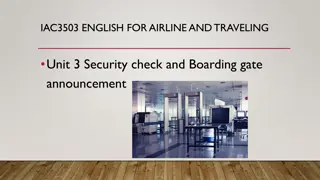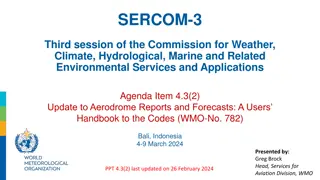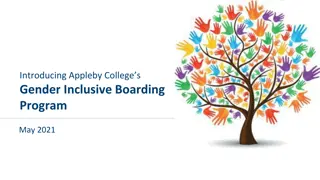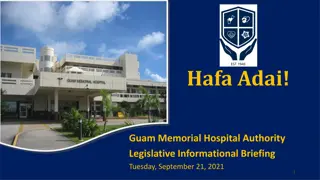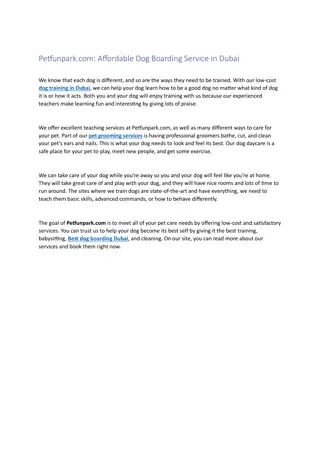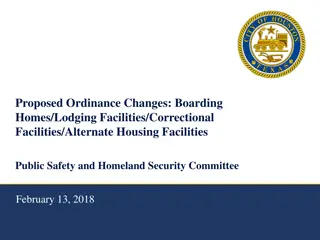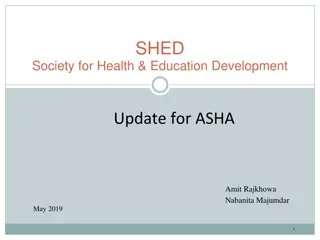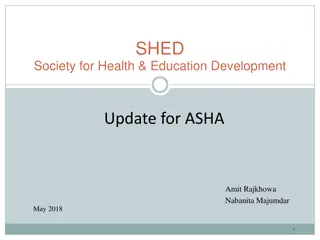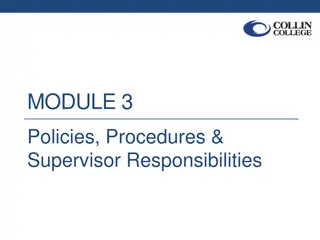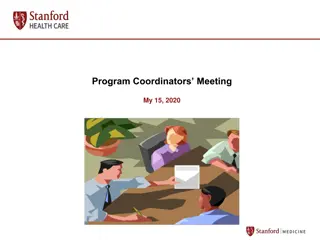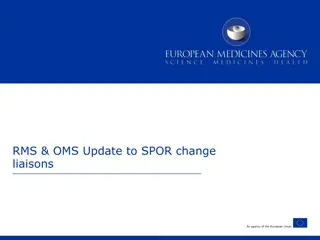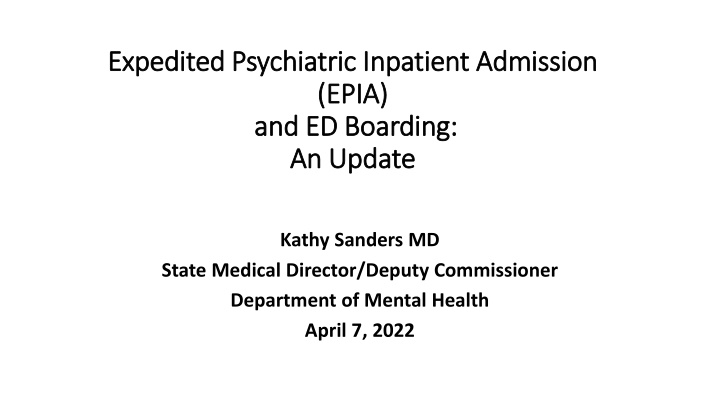
Update on Expedited Psychiatric Inpatient Admission (EPIA) Initiative
Explore the Expedited Psychiatric Inpatient Admission (EPIA) Initiative launched in 2018 to address the needs of long ED boarding through advocacy and data-driven solutions. Learn about the escalation process, team structure, response to COVID, and efforts to provide timely psychiatric treatment for individuals in crisis.
Download Presentation

Please find below an Image/Link to download the presentation.
The content on the website is provided AS IS for your information and personal use only. It may not be sold, licensed, or shared on other websites without obtaining consent from the author. If you encounter any issues during the download, it is possible that the publisher has removed the file from their server.
You are allowed to download the files provided on this website for personal or commercial use, subject to the condition that they are used lawfully. All files are the property of their respective owners.
The content on the website is provided AS IS for your information and personal use only. It may not be sold, licensed, or shared on other websites without obtaining consent from the author.
E N D
Presentation Transcript
Expedited Psychiatric Inpatient Admission Expedited Psychiatric Inpatient Admission (EPIA) (EPIA) and ED Boarding: and ED Boarding: An Update An Update Kathy Sanders MD State Medical Director/Deputy Commissioner Department of Mental Health April 7, 2022
Expedited Psychiatric Inpatient Admission (EPIA) Initiative began in 2018 under Secretary Sudders as an escalation process to address the needs of long ED BH boarders through State Advocacy to facilitate psych admissions as well as data collection to further solutions Escalation starts with ED and ESP engagement and bed search efforts, insurance carrier notification and advocacy support, state agency help, and final escalation to DMH and EOHHS Anyone boarding in an ED requiring inpatient treatment will have their insurance carrier notified as soon as possible and no later than 24 hours into the boarding episode If continued efforts by both ED/ESP and Insurer are not able to secure an admission, DMH is notified at 60 hours of boarding. Draft for Discussion only 2
Overview of EPIA Overview of EPIA The DMH EPIA team includes 2 admission advocates, a liaison with MassHealth, and 2 administrative positions to manage the data collection The team keeps inpatient facilities aware of who is boarding the longest and advocates for those individuals until admitted or a Change of Level of Care occurs Advocacy entails twice daily email notifications of who is boarding for two weeks or longer (generally 25 40 individuals daily) Additionally, personalized efforts are made to better understand the barriers preventing admission and use creativity with insurers, State Agencies, and inpatient providers to decrease those barriers At times, a case conference is called by the State Medical Director with Insurers, hospitals, and state agency staff to best provide needed treatment
EPIA EPIA Response Response to COVID to COVID During early phase of COVID Pandemic, the time to escalate to DMH was decreased from 96 hours of boarding to 48 hours to increase throughput in EDs By June 2020, it became evident that the behavioral health needs of the population were overwhelming EDs. Starting June 2020, BH Boarders increased 3-4 times seen June 2019 and has persisted monthly through 2021 with an upward trend By July 2020, EPIA decreased the time to escalation to 24 hours of boarding MassHealth & MBHP provided extra staff through 2020 due to volume Escalation time to DMH was stabilized at 60 hours of boarding by December 2020 and has remained there to give both EDs/ESPs and Insurance Carriers adequate time for their bed search and advocacy efforts
COVID Pandemic COVID Pandemic & ED Boarding & ED Boarding Hospital Admissions by Calendar Year Mean # 76,702 90000 80000 70000 Numbers of ED Boarders increased 74516 75390 75197 74387729167131869063 69063 69522 68332 60000 6101163014 Anecdotally: acuity/complexity and demand for inpatient service elevated 50000 40000 Beds blocked due to workforce shortages and/or COVID infection with a licensed bed operational capacity decrease from 2900 to 2500 30000 20000 10000 0 Community resources (group homes, CBAT, etc) limited as are inpatient beds. 2010 2011 2012 2013 2014 2015 2016 2017 2018 2019 2020 2021
EPIA Referral Trend due to COVID EPIA Referral Trend due to COVID
What have we learned? CY2021 What have we learned? CY2021 In 2021: 7331 referrals to DMH to assist with inpatient placement from EDs (up from 4304 in CY2020) 2,670 youth (36%) 4,661 adult (64%) Recidivism: 14.2% of referrals for DMH assistance had more than one long ED boarding episode (>60 hours) during CY2021 State Agency Involvement: 1,867 (26%) Change of Level of Care: 40% Those admitted (4,379) reflect 7% of all admissions (61,250) 73% admitted to 30% of the licensed inpatient units (range 7- 34/month) Draft for Discussion only 7
EPIA 2021 Data Analysis: What we learned EPIA 2021 Data Analysis: What we learned 2021 7,331 2020 4,305 2019 842 Total EPIA Referrals Ave Time to Placement(ATP) 3.5 days Change of Level of Care EPIA Admissions Total Acute Admissions EPIA Admissions % of Total 2.5 d 29% 3,057 60,082 5% n/a 14% 724 66,969. 1% 40% 4,374 61,250 7%
Demographics of CY2021 EPIA Referrals N=7,331 Demographics of CY2021 EPIA Referrals N=7,331 Age 0-12 13-17 18-22 23-64 65+ Total Gender Male Female Trans Race/Ethnicity White Black Hispanic Asian Unknown % 10 26 7 51 6 100 ATP 6.6 4.7 2.8 2.4 3.4 3.5 % 52 15 14 2 18 ATP %Pop 3.3 3.7 3.6 1.8 3.9 78 7.6 21 6.6 -- 50 46 4 3.4 3.5 5.3 Average Time to Placement = ATP
3/19/2025 10
3/19/2025 11
Diagnoses for All Referrals (7,331) Diagnoses for All Referrals (7,331) TOP 5 Diagnoses Depression Psychosis/schizophrenia Bipolar PTSD Impulse/Conduct Dx ADHD Anxiety ASD/ID/DD Bipolar Dementia Depression Impulse/Conduct Dx Medical Other Personality PTSD Psychosis/schizophrenia Substance Use Disorder 0.7% 2.1% 3.2% 1.8% 15.4% 1.6% 31.2% 3.8% <0.05% 7.8% 0.5% 6.7% 24% Less than 3%: Anxiety ADHD ASD/ID/DD Dementia SUD Personality
Barriers Barriers Aggression/Acuity Bed Availability Clinical Disposition/Homeless Insurance Issue Legal No Barrier/Blank Preference Transportation Unsuccessful Previous Hosp 14% 58% 5.5% 2.1% 3.2% <0.0% 11% <0.0% 1.6% 2.4%
Boarding Hospitals (N=7,331) Boarding Hospitals (N=7,331) Ages 0-17yo (total N=2,670) Ages 18-65+yo (N=4,628) Children s Lowell General/Saints Bay State Springfield Mass General Beverly Boston Medical Center Brockton South Shore Cape Cod UMass Medical Center Lowell General/Saints Mass General Baystate Springfield Leominster South Shore BID Boston Brockton Boston Medical Center North Shore Medical Sturdy Memorial 506 182 143 88 86 86 85 83 81 62 612 280 246 197 169 164 164 162 130 125
Admitting Hospitals for 4,346 (40% CLOC) Admitting Hospitals for 4,346 (40% CLOC) Ages 0-17 (N=1416 ) CLOC=47% Ages 18+ (N=2,930) CLOC=37% Cambridge Hospital TaraVista Southcoast Children s Fuller Pembroke Arbour Anna Jacques North Shore Medical Hospital Behavioral Med 59 Southcoast Arbour Haverhill Pavilion Fuller Hospital Behavioral Med 117 Pembroke TaraVista Bournewood Brockton Bayridge 204 157 153 111 95 71 69 62 60 254 243 165 142 112 101 91 87 85
ED Boarding ED Boarding Both Pre and Post Pandemic ED Behavioral Health Boarding issues are the same: just magnified System still primarily inpatient or outpatient with pockets of services and resources for special populations mostly financed by MassHealth or State Agencies. All levels of care are experiencing workforce shortages Decreased access to community-based care Increased complexity and acuity of population presenting for care Hybrid delivery of BH care: in person and virtual/remote ED only place to reliably receive in-person services Draft for Discussion only 16
State Response (Policy and Regulatory) State Response (Policy and Regulatory) Multivariate approach to a multiple causation problem Behavioral Health Roadmap is the way forward- specifically, the restructuring of 24/7 Help Line, community-based crisis services and urgency care/CBHCs. Adjusting of regulations around use of telemedicine and expanded scope of practice for some licensed staff to extend workforce response DMH Needs of Commonwealth to prioritize child and adolescent bed increases and other specialty units (DD/ASD, geriatric) Increased staffing for EPIA for increased boarding numbers (MassHealth, MBHP, DMH) in 2020 Monitoring EDs for volume and acuity (EHS, DMH, MassHealth) Draft for Discussion only 17
State Response (Financial and Service) State Response (Financial and Service) Funding & regulation to support increased inpatient bed capacity and clinical competency Multiple rounds of COVID funds to all hospitals and community providers to support continuity of operations COVID Units in psychiatric hospitals funded by MassHealth to ensure access during surges Enhanced MassHealth rates to cover increased costs associated with COVID infection control requirements Funding incentives from MassHealth to increase bed numbers over 2019 capacity Year Licensed Op Capacity 2019 2896 2708 2020 2778 2445 2021 2953 2502 ED Diversion programs (DMH, MassHealth) Draft for Discussion only Difference 188 333 451 18
Ongoing and In Ongoing and In- -Planning Initiatives Planning Initiatives Incentive funds to create new inpatient beds through 2022 ED Diversion Initiatives DMH ED Diversion Teams (Youth and Adults- Multiple Providers including Youth Villages Intercept Model of diversion and warm handoff) MBHP/MassHealth ED Diversion initiatives BH Roadmap to provide more community access to integrated, timely treatment Commonwealth wide CBHCs accountable for fully integrated MH/SUD treatment, BH urgent care crisis services including new youth crisis stabilization beds 24/7 BH Help Line Completely restructured 24/7 community-based payer blind crisis services Insurance carrier transparency and access to billing codes for increased treatment services both during ED and Inpatient care (e.g., specialing, single room rates, medical complexity enhancements) Financing of behavioral health assessment and treatment while in ED Use of ARPA Funds to engage technological solutions to support electronic clinical communication and transparency of bed availability Use of ARPA Funds to address Workforce issues (Legislative, MassHealth, Agency levels) Draft for Discussion only 19




